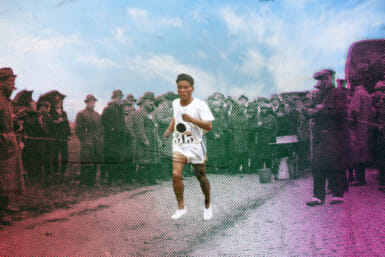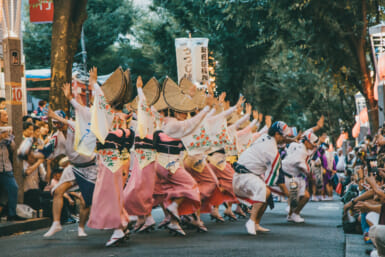Music, we are often informed, is the international language.
Locally, however, that language sounds suspiciously like English with a musical accent. Music industry copywriters constantly delve into their dictionaries for English words to be transformed into easily understood catch-phrases for the latest discs and groups from overseas.
Thus, potential CD purchasers are showered with ads touting one band’s hotto messeeji (hot message) from the uesuto koosuto (West Coast). An album by a noted lyricist is a soro rekkodeingu (solo recording) from- a fueimasu raitaa (famous writer), while the latest release from a female vocalist is identified as a shitei rabusangu (city love long) by an enjieru kuiin (angel queen).
Japanglish-speaking concertgoers have been informed in promotional flyers of the arrival in Tokyo of a group noted for its modan (modern) and sumaato (smart) bookaro sutairu (vocal style), not to mention its very appu-tsu-deito hamonii (up-to-date harmony). This particular aggregation, by the way, gave a jointo konsaato (joint concert) with a furesshu guruupu (fresh group), whose members are blessed with good rukkusu (looks), and are enerugishu (energetic) to boot.
To be sure, it’s not only to musical acts from across the pond that Our Hosts attach such not-quite-English-yet-not-entirely-Japanese words. A leading doll manufacturer in Tokyo’s Taito Ward has received an average of 3,000 letters a year for the past half-dozen years from parents who think they can win the company’s annual contest to honor Japan’s most uniquely named child.
One girl was given a name written with the ideograms for “seven” and “sand” and pronounced “Nasa,” as in National Aeronautics and Space Administration, because her parents wanted her always to remember “to look to the heavens.” A boy boasted a name written with the characters for “flax,” “garment” and “human being” and pronounced “Maito,” as in dainamaito (dynamite): his parents wanted him to be powerful.
Additionally, little Madori owes her name to her mother’s wish some day to travel with the girl to Madorido (Madrid); little Kento owes his name to his parents’ fascination with Superman’s alter ego, Kuraku Kento.
Whereas parents in the past were more likely to be concerned with the look and meaning of juxtaposed ideograms, the way ideograms sound when pronounced together is likelier to be of more importance to today’s moms and dads, says Yosuke Nakagawa, a researcher of both personal and family names. But perhaps the parent most famous for naming his offspring with an eye to the ear was Ogai Mori, one of Japan’s leading novelists and a German scholar who combined various ideograms to give his five children such German-sounding names as Oto (Otto), Mari (Marie) and Furitsu (Fritz).
Whatever you may think of Oto and Furitsu, not to mention Nasa and Maito, you’d probably agree they’re better than the Mickey Mouse name that Hidekazu and Kiyomi Kadokura of Ichikawa, Chiba Prefecture, gave their son. Written with the ideograms for “allocate” and “bush,” the boy’s name is pronounced “Mikki;” the name of the Kadokuras’ daughter, written with the ideograms for “beauty,” “resemble” and “clothes,” is pronounced “Minii.” Mikki and Minii—a not unexpected development for a mother and father who own approximately 10,000 Disney-related items and who have decorated one side of their house with a colorful representation of Mickey Mouse’s full-frontal phiz.
But for the most felicitous domestic use of English, one must peruse the shelves of this country’s many retail outlets. Over the years, we’ve seen the introduction of Reguts (a vitamin drink), Nazal—For Stuffed Nose and Snot (a decongestant), Creamy Discolor (a hair lightener), Benefique Gritty Pretty Cream (a cosmetic), Mouth Pet (a breath freshener), Bust Coupling Series (stereo components) and this publication’s three favorite products for infants—Lusty Bunny (a baby jumper), Skina Babe (baby oil) and My Pee (baby shampoo). That last product name was obviously created by a real marketing whiz.









